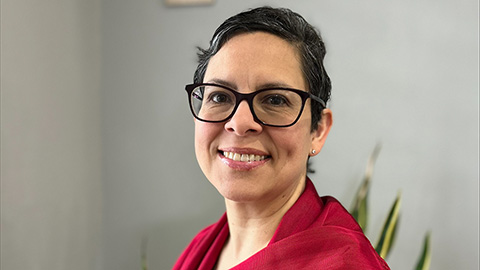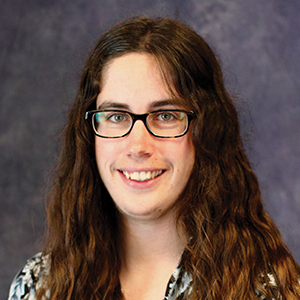Seeking new techniques to track protein breakdown
Jana Zecha has developed techniques that will help researchers learn how protein modifications can affect their stability.Cells are protein factories, constantly making new proteins and breaking down damaged or unnecessary ones. Cells must regulate these processes tightly for thousands of proteins to support cellular function, and Jana Zecha has developed a new technique to monitor this protein turnover.

During her early biology courses in Burghausen, a small town in Bavaria, Zecha became curious about how single molecules work together to produce a functioning organism. She earned a bachelor’s degree at the Technical University of Munich, completing a thesis project on gene expression in gestational diabetes. She became interested in technologies that scientists could harness to investigate the molecular bases of disease.
Zecha remained in Munich to work in Bernhard Küster’s group, earning a master’s degree and then beginning her Ph.D. research, studying how protein modifications determine their breakdown rates at a cell-wide level. Her project built on earlier work in the Küster lab that suggested established methods had difficulty tracking modified proteins.
Using the classical approaches for the measurement of cellular protein turnover,” Zecha said, “many important aspects of cell biology have so far been overlooked or remained ‘invisible.’”
After developing new techniques and data analysis approaches, she could track breakdown and production of thousands of modified proteins over time. Her work has laid the foundation for future investigations into how protein modifications can affect their stability.
Zecha enjoys teaching young scientists. She has mentored undergraduate researchers in the Küster lab and has taught courses in Munich and Taiwan.
“Although teaching is, of course, always lots of work,” she said, “for me it is also great fun and a pleasure to pass on my enthusiasm for science and guide and help students to recognize and develop their potential.”
Zecha is in the final stage of her Ph.D. thesis work in Bernhard Küster’s lab.
Tagging and tracking modified proteins
Multiple versions of the same protein can arise from a single gene, either through alternative splicing of messenger RNA or through chemical modifications of the final protein product. These modifications can change the protein’s life span, affecting how long it can carry out its function.
Jana Zecha and her colleagues developed a strategy to measure the life spans of thousands of proteins simultaneously. They fed cells amino acids made with heavier carbon and nitrogen isotopes. As the cells digested old proteins and produced new ones, more and more proteins incorporated heavy amino acids. They combined this system with a tagging method to track protein replacement over time.
The protein lives they measured spanned several orders of magnitude; some were broken down and replaced in minutes, while others lasted weeks. Because their data set captured thousands of proteins, the researchers could detect relationships between protein life span and protein abundance, chemical composition and cellular location. They also detected new relationships between modifications and life span.
“Our study has broad implications for basic as well as pharmaceutical research, since many neurodegenerative, age-related and cancer diseases are associated with altered protein life spans,” Zecha said.
The researchers plan to leverage their new tools to connect protein life span with cancer drug efficacy and side effects.
Enjoy reading ASBMB Today?
Become a member to receive the print edition monthly and the digital edition weekly.
Learn moreGet the latest from ASBMB Today
Enter your email address, and we’ll send you a weekly email with recent articles, interviews and more.
Latest in People
People highlights or most popular articles

MOSAIC scholar explores enzymes
Organic chemist Edwin Alfonzo's scientific journey took an unexpected turn when he discovered the world of enzymes.

Honors for Wright, Chiu and Flanegan
Awards, promotions milestones and more. Find out what's going on in the lives of ASBMB members.

In memoriam: Michael Waterfield
He was a British biochemist and a pioneer in the cancer research field who opened a proteomics lab at University College London.

Bakers and mentors help a MOSAIC scholar change her life
Joanna-Lynn Borgogna studies the vaginal microbiome, the metabolome and the development of gynecological disorders in reproductive-aged women.

Swapping stethoscope for pipette to understand diabetic retinopathy
MOSAIC scholar Emma M. Lessieur Contreras is inspired by the work of her ophthalmologist father.

Honors for Lemon, Silva and Brownlee
Awards, promotions, milestones and more. Find out what's going on in the lives of ASBMB members.

